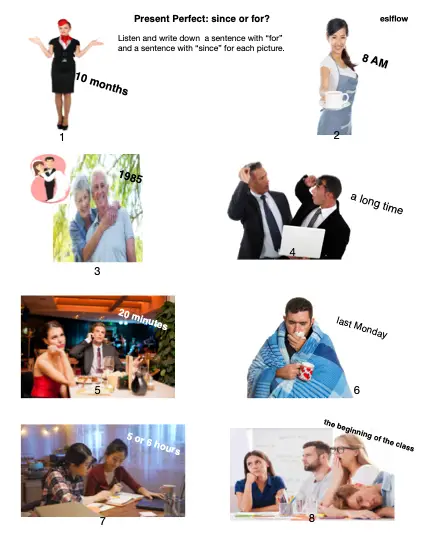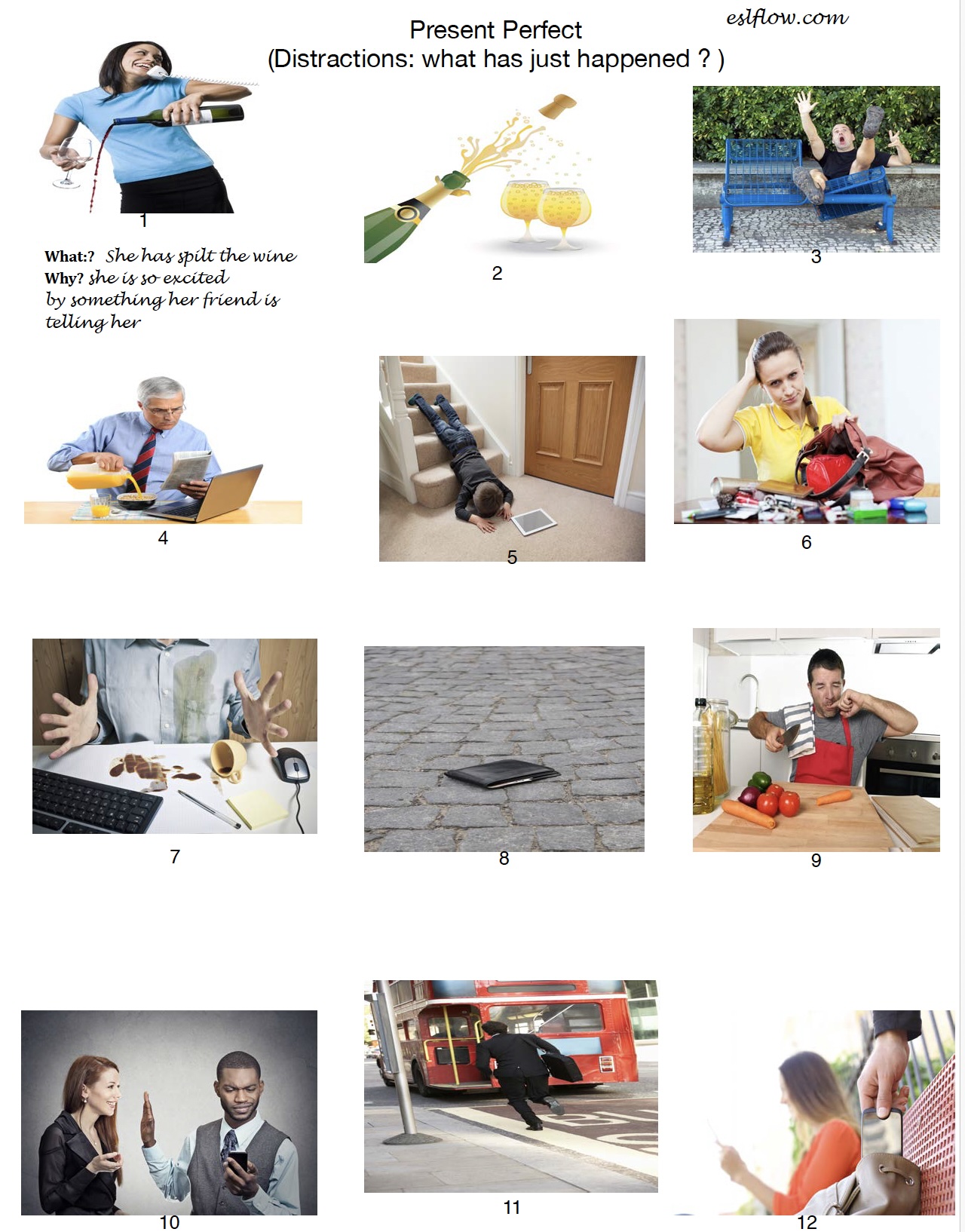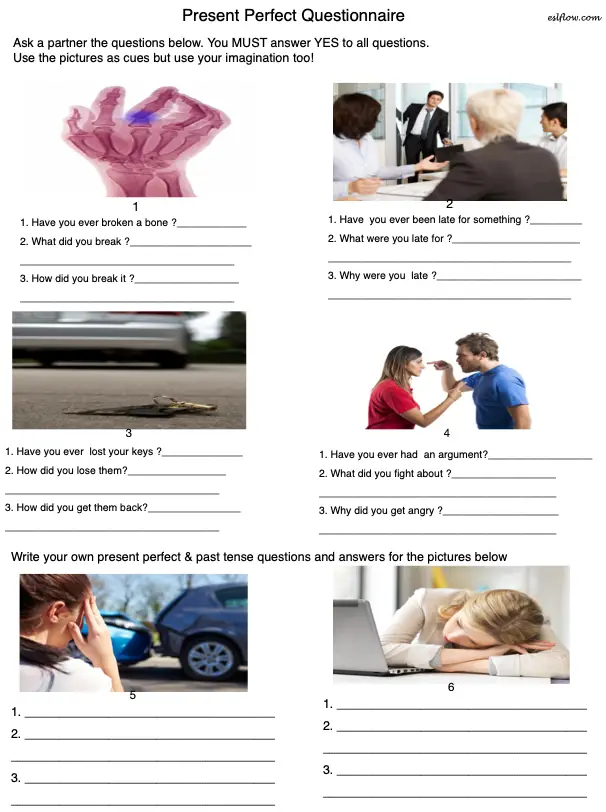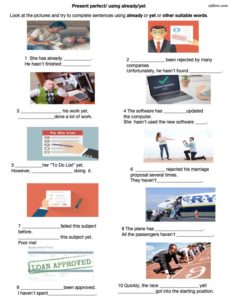9 Present Perfect Grammar, Speaking and Listening Exercises
29th October 2024
Teaching the Present Perfect
These present perfect exercises provide learners with a variety of practical opportunities to master this essential tense across contexts like casual conversation, business English, and personal experiences, building the skills to confidently discuss completed or ongoing actions, recent events, and short or long timespans.
1 Present perfect: since or for ? (with answers and audio)
This is a listening/speaking activity to help English language practice using “since” or “for”. Students use the time cues in the pictures to write complete sentences in the the present perfect tense. Or use it as a listening exercise. Students listen to the audio and write appropriate sentences for the pictures.

Subscribe to Eslflow
Subscribe to get full access to the latest and best resources from eslflow.com. There are no ads in the newsletter and you will receive entertaining, high quality, and up-to-date teaching resources regularly. And, if you subscribe, you will get access to the latest advancements in artificial intelligence and prompt engineering, that will enable you become a master of the English as a second language universe! In addition, you will get access to the latest exercises, with a wider variety of exercises and activities.
2 Present perfect: What has just happened?
This is a present perfect exercise for English language learners to practice using the present perfect to talk about events that have just happened (a past event affecting the immediate present). Students use the picture cues to write appropriate sentences.

3 Present perfect awareness exercises
This worksheet helps students really understand how to use the present perfect correctly. It makes them think hard about time expressions, how recent actions are, and how long they last. By explaining their answers, students show they truly grasp the concept, not just memorize rules. As a teacher, you can see their thinking and help them learn better.
Present perfect awareness exercises (PDF)
4 Present perfect conversational practice
These present perfect conversational practice exercises contain sets of conversational questions, along with multiple potential responses and a follow-up question for each. The questions aim to help ESL (English as a Second Language) students improve their understanding and usage of specific aspects of grammar in English. In my experience, these kinds of exercise are really useful teaching one-on-one online, but they also work really well as pair work activities in the classroom.
Present perfect yes/no questions (this is the format usually used for introducing students to the present perfect)
Present perfect expanded (this is a little more advanced)
5 Present perfect questionnaire
This is a present perfect exercise and worksheet for English language learners. Students answer the questions with their own ideas and using appropriate tenses. For the last two items, they write both questions and answers.
Present perfect questionnaire (PDF)
6 Present perfect: already or yet? (with answers and audio)
This is a listening/speaking present perfect exercise for English language learners to practice using “already” or “yet”. Students use the cues in the pictures to write complete sentences in the the present perfect tense. Then students can listen and compare their answers to the audio.
Present perfect: already or yet ? (PDF)
(see the YouTube version of this exercise)
Related Resources
ESL Listening Activities Guide
Comparative adjective exercises
Teaching Gerunds and Infinitives
10 Adjectives Exercises Including Adjectives for People and Things
6 Picture-Based Present Continuous Worksheets (PDF)
8 Preposition Exercises for Location, Time and Movement (PDF)
5 Useful Passive Voice Practice worksheets
7 Incredibly Useful Past Tense Simple Teaching Activities (PDF)
Great Exercises for the Conditionals (PDF)
Future Tense Exercises including future perfect
7 Present perfect continuous conversational practice
This is a practical worksheet focusing on the present perfect continuous tense, ideal for both one-on-one, pair work and online teaching settings. The questions are a catalyst for short exchanges involving various scenarios. It offers learners the opportunity to enhance their conversational skills. The responses help engage the students and the follow-up questions allow for the exchanges to be expanded into conversations.
8 Present perfect continuous: stative vs continuous
Understanding stative verbs is crucial for anyone studying the present perfect continuous, as it aids in differentiating between states and ongoing actions or events. Stative verbs, which usually depict unchanging situations or states rather than actions, aren’t commonly used in continuous tenses, leading to frequent errors in English usage. This exercise aims to strengthen students’ understanding and application of stative verbs, reducing common grammatical mistakes and enhancing your overall fluency in English.
In this table, the stative verbs in the present perfect form describe a state or condition that has existed up to the present, while the active verbs in the present perfect continuous form describe actions that started in the past and are still ongoing or have just finished.
Download stative vs active PDF
9 Present perfect: common experiences
This is a present perfect exercise for English language learners to practice using the present perfect to talk about common experiences.
Present perfect: everyday experiences questionnaire (PDF)






